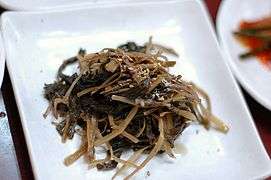Chwinamul
| Chwinamul | |
| Hangul | 취나물 |
|---|---|
| Revised Romanization | chwinamul |
| McCune–Reischauer | ch'winamul |
| IPA | [tɕʰɥi.na.mul] |
Chwinamul (취나물) is a Korean word that refers to a number of leaf vegetables growing in the mountains and fields that have heart-shaped serrated leaves and a unique fragrance. The word chwinamul in its strict sense refers only to chamchwi (참취, "edible aster"), literally translated as "true chwi". However, there are about a hundred varieties of chwinamul that grow naturally in Korea, including sixty-odd edible varieties.[1] Among them, gomchwi (곰취, "Fischer's ragwort"), gaemichwi (개미취, "Tatarinow's aster"), miyeokchwi (미역취, "Asian goldenrod"), surichwi (수리취, "deltoid synurus"), matari (마타리, "golden lace"), and gaksichwi (각시취, "maiden saussurea") are the most eaten varieties.
Gallery
See also
References
- ↑ 조, 성태 (21 March 2006). "취나물, 기관지에 좋은 무기질 보물창고" [Chwinamul, repositorium of minerals beneficial for bronchial and respiratory conditions]. The Jugan Kyunghyang (in Korean). Retrieved 17 December 2016.
This article is issued from
Wikipedia.
The text is licensed under Creative Commons - Attribution - Sharealike.
Additional terms may apply for the media files.

_(Fischer's_ragwort).jpg)